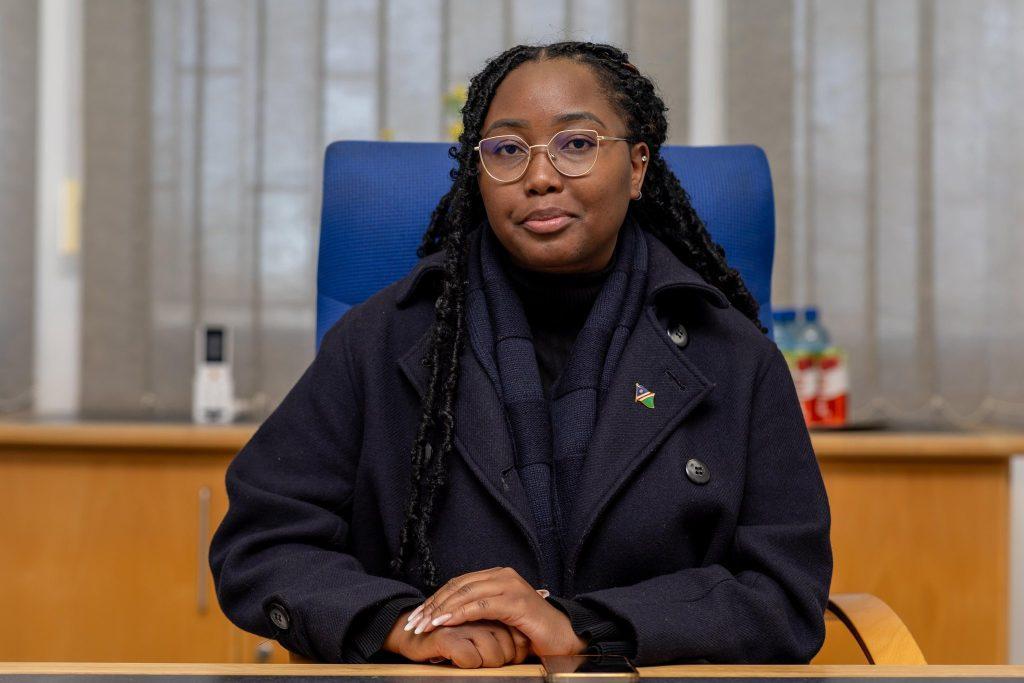Africa-Press – Namibia. Keynote address by Emma Theofelus, minister of information and communication technology, delivered by Frans Nghitila, at the Forum on Internet Freedom in Africa, Mercure Hotel, Windhoek, 25 September 2025
On behalf of the government and the people of Namibia, it is my honour and privilege to welcome you to Windhoek for the 12th edition of the Forum on Internet Freedom in Africa, also known as FIFAfrica.
We are deeply proud to host this gathering in our capital, a city that has long been a meeting point of ideas, and now, a hub for dialogue on the future of our continent’s digital society.
Namibia’s own digital journey has been one of deliberate ambition and evolving commitments. As a nation, we have recognised that technology is not a luxury, but a necessity for inclusive development, democratic governance, and sustainable growth.
Our efforts such as the Sixth National Development Plan and our National Digital Strategy seek to ensure that information and communication technologies are embedded across every sector including education, healthcare, agriculture, and public service delivery.
Recently, we also made a key move forward with comprehensive legislation to govern artificial intelligence and digital safety, including the development of a draft artificial intelligence bill, data protection bill, and cybercrime bill. These developments are all part of our broader digital transformation strategy aimed at modernising governance and managing emerging technology risks.
Ultimately, we are laying the foundations of a digital economy that serves our people by connecting the unconnected, fostering local innovation, and strengthening trust in digital governance.
This is not without challenges. Namibia, like many of our African neighbours, must contend with the digital divide, the affordability of services, and the risks posed by disinformation, misinformation and online harms.
Our recent efforts are a response to these realities as we strengthen our policies and build resilient governance frameworks. As a ministry, our aim remains clear on the creation of a digital environment that reflects and responds to the interests of our citizens, upholds their rights, and amplifies their voices. This extends to visitors who cross our borders, including many of whom are gathered here today.
Namibia’s ambitions are inseparable from the broader African digital ecosystem. Frameworks such as the African Union’s Digital Transformation Strategy (2020-2030), the Policy and Regulatory Initiative for Digital Africa, and the Continental Artificial Intelligence Strategy give us a roadmap for a future that is inclusive and rights-based.
Beyond policies and strategies lie the people of this great continent, especially the youth. They are shaping and reshaping the digital landscape every day.
In Namibia, we see young innovators and entrepreneurs using technology to solve pressing social challenges such as improving climate-smart agriculture to building start-ups that create jobs and unlock economic opportunity.
Across Africa, we are witnessing citizens demanding accountability online and connecting in ways that reinforce democracy and civic participation.
This people-centred energy is what makes gatherings such as this Forum on Internet Freedom in Africa vital. This energy is also reflected in the ambition of a solo biker riding across 10 African countries including Namibia, to highlight the practice of digital safety. It is also reflected in the online community supporting the forum, and indeed through those who have journeyed across many borders, airports and buses to be here today.
As a ministry we are pleased to support this gathering alongside the Collaboration on International ICT Policy for East and Southern Africa and to live up to the spirit of the community called #InternetFreedomAfrica.
We acknowledge the role that this forum has played over the years in convening diverse voices, shaping digital policy, and amplifying African perspectives on global debates. This forum will also serve as the platform for the unveiling of the Digital Democracy Declaration for Africa here in Windhoek which resonates with our commitment for technology in Africa to serve people first, uphold their dignity, protect their rights, and advance inclusion.
On the premise of technology serving our people, first comes the question of data. The data on the African continent is highly sought after. Think about the natural resource data that we have, think about the data that is being generated by the youngest population of the world.
However, is this data serving the African people? Will Africa benefit the most from the data we produce? Will we see real monetisation of this data so much so that it improves the livelihoods of Africans?
These are the questions we must interrogate, while we fight for safety and inclusion we must decide on the quantum in monetary terms of how Africa is going to benefit from a free internet.
As hosts, Namibia is honoured to contribute to this important journey. We believe that internet freedom is not only about connectivity but also about opportunity, evolution and growth as societies and as people.
It is about ensuring that our continent’s digital future is forged by Africans, for Africans, in line with the aspirations of Agenda 2063 of the African Union.
Let this forum be a moment of renewed commitment. Let it be a space where ideas meet action, where research informs policy, and where collaboration turns challenges into opportunities. Together, we can build a digital Africa that is open, inclusive, secure, and truly democratic.
I thank you, and I wish you fruitful deliberations at FIFAfrica 25.
For More News And Analysis About Namibia Follow Africa-Press






